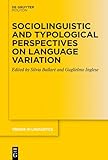Sociolinguistic and Typological Perspectives on Language Variation / ed. by Silvia Ballarè, Guglielmo Inglese.
Material type: TextSeries: Trends in Linguistics. Studies and Monographs [TiLSM] ; 374Publisher: Berlin ; Boston : De Gruyter Mouton, [2023]Copyright date: ©2023Description: 1 online resource (V, 220 p.)Content type:
TextSeries: Trends in Linguistics. Studies and Monographs [TiLSM] ; 374Publisher: Berlin ; Boston : De Gruyter Mouton, [2023]Copyright date: ©2023Description: 1 online resource (V, 220 p.)Content type: - 9783110781069
- 9783110781236
- 9783110781168
- 417
- online - DeGruyter
- Issued also in print.
| Item type | Current library | Call number | URL | Status | Notes | Barcode | |
|---|---|---|---|---|---|---|---|
 eBook
eBook
|
Biblioteca "Angelicum" Pont. Univ. S.Tommaso d'Aquino Nuvola online | online - DeGruyter (Browse shelf(Opens below)) | Online access | Not for loan (Accesso limitato) | Accesso per gli utenti autorizzati / Access for authorized users | (dgr)9783110781168 |
Frontmatter -- Contents -- 1 Analyzing language variation: Where sociolinguistics and linguistic typology meet -- 2 Isolation, complexification, and development of unusual features: A case study from some Gallo-Italian dialects of Northern Italy -- 3 On typological shift in Inner Anatolian Greek -- 4 Social factors in mixed language emergence: Solving the puzzle of Amish Shwitzer -- 5 Socio-linguistic effects on conditional constructions: A quantitative typological study -- 6 Counterfactual conditionals: Linguistic variation in Italian and beyond -- 7 Syntactic elaboration in the domain of periphrasticity: Evidence from Spanish -- Index
restricted access online access with authorization star
http://purl.org/coar/access_right/c_16ec
Linguistic variation, loosely defined as the wholesale processes whereby patterns of language structures exhibit divergent distributions within and across languages, has traditionally been the object of research of at least two branches of linguistics: variationist sociolinguistics and linguistic typology. In spite of their similar research agendas, the two approaches have only rarely converged in the description and interpretation of variation. While a number of studies attempting to address at least aspects of this relationship have appeared in recent years, a principled discussion on how the two disciplines may interact has not yet been carried out in a programmatic way. This volume aims to fill this gap and offers a cross-disciplinary venue for discussing the bridging between sociolinguistic and typological research from various angles, with the ultimate goal of laying out the methodological and conceptual foundations of an integrated research agenda for the study of linguistic variation.
Issued also in print.
Mode of access: Internet via World Wide Web.
In English.
Description based on online resource; title from PDF title page (publisher's Web site, viewed 25. Jun 2024)


